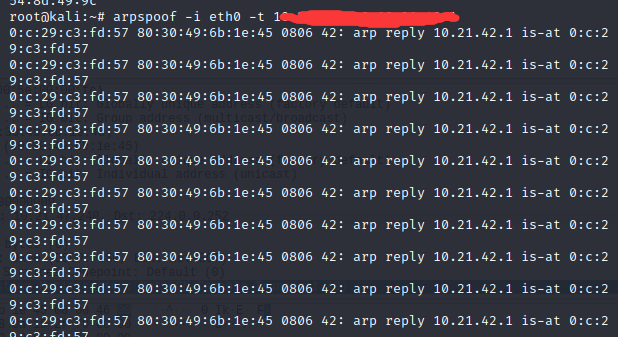
- #ARPSPOOF LIBNET_CHECK_IFACE() IOCTL: NO SUCH DEVICE DRIVER#
- #ARPSPOOF LIBNET_CHECK_IFACE() IOCTL: NO SUCH DEVICE CODE#
See the second line that is giving the response from directly from the router with valid Google IP. It gives me this information by that I have observed that the DNS response is coming from the router faster than me. However, I have observed in Wireshark at the victim system. I am getting the above responses, but DNSspoofing is not working for the victim. You can also specify the device to avoid false positives: ip addr show dev eth0.
#sudo arpspoof -t 192.168.1.1 192.168.1.224 -i wlan0Īnd I have done DNSspoof sudo dnsspoof -f spoofhosts.txt -i wlan0 host 192.168.1.224 and udp port 53ĭnsspoof: listening on wlan0 ġ92.168.1.224.15703 > 192.168.1.1.53: 32219+ A? .inġ92.168.1.224.14489 > 192.168.1.1.53: 3788+ A? .in Exemplos: Erro de interface não encontrada: rootkali iw dev wlan00 scan command failed: No such device (-19) Como solução, digite o comando ifconfig -a e confirme o nome de todas as interfaces presentes no sistema: rootkali ifconfig -a eth0 Link encap:Ethernet HWaddr 54:42:49:f4:84:71 inet6 addr: fe80::5642:49ff:fef4:8471/64 Scope. The output also contains UP if the device is up, but no cable is connected: 2: eth0:I have enabled Kernel IP forward in Linux. When I try to run my application I can see that the device was opened and immediately closed but can't see any prints from my ioctl function.My network is using a wireless router with the address 192.168.1.1 and primary DNS is the same as the router address.
#ARPSPOOF LIBNET_CHECK_IFACE() IOCTL: NO SUCH DEVICE DRIVER#
I can't see any error messages, when the device driver is loaded I get all the prints. Printk("ERROR: copy_from_user in controlLED1_ioctl returned unfinished bytes\n") Result = copy_from_user(sLedControlParam, (struct s_LEDControl *)arg, sizeof(struct s_LEDControl)) Printk("ERROR: Memory allocation failed in controlLED1_ioctl\n") SLedControlParam = (struct s_LEDControl *)kmalloc(sizeof(struct s_LEDControl), GFP_KERNEL) The problem of arpspoof: libnetcheckiface() ioctl: No such device appears when. After step three and four, now all the packet sent or received by victim should be going through attacker. And then setting up arpspoof from to capture all packet from router to victim. Static int controlLED1_ioctl(unsigned int arg) A simple experiment on host arp deception in a virtual machine. The next step is setting up arpspoof between victim and router. Static int device_ioctl( struct inode *inode, struct file *filp, unsigned int cmd, unsigned long arg)Ĭase c_controlLED1: controlLED1_ioctl(arg) ĭefault: printk("ERROR: Invalid command %d\n", e_cmd) ** Assign device functions to file_operation structure */ in elementary OS luna which is build on ubuntu 12.
#ARPSPOOF LIBNET_CHECK_IFACE() IOCTL: NO SUCH DEVICE CODE#
The above C program is cross compiled to PPC environment.īelow is some part of the driver code MODULE_LICENSE("XXX") I am new to linux and device drivers, any help would be appreciated. Just to check if something was wrong with the file descriptor, I passed a dummy file descriptor to ioctl and I got the correct error number. Printf("ERROR: ioctl failed Reason:%s FD:%d\n", strerror(errno), fDDevice)

IoctlReturn = ioctl(fDDevice, c_controlLED1, &sLedControlParam) I was just curious because it never saw unlockedioctl before. static long deviceioctl(struct file file, unsigned int cmdin, unsigned long arg) I haven't verified it, but maybe it helps. Printf("ERROR: Cannot open the device /dev/newdevice_drv\n") static int deviceioctl( struct inode inode, struct file filp, unsigned int cmd, unsigned long arg) but he says it has to be. * Prepare the message to be sent to Kernel Space */įDDevice = open("/dev/newdevice_drv", O_RDWR) It shows the following on my device: PHY Interface Driver Chipset phy0 wlp1s0 ath9k Qualcomm Atheros QCA9565 / AR9565 Wireless Network Adapter (rev 01) Here you can see that my device's interface is wlp1s0 and you can start it like this: sudo airmon-ng start wlp1s0 The interface name may be different for you.
 Then I wrote a program in user plane to control the LED on the board, but my ioctl is failing with error number as 2 (No such File or Directory), the file descriptor returned is 3. arping -i
Then I wrote a program in user plane to control the LED on the board, but my ioctl is failing with error number as 2 (No such File or Directory), the file descriptor returned is 3. arping -i I have created a device file in /dev directory with the correct major number. PMD: Initializing pmdpcap for netpcap1 PMD: Couldnt open 0000:82:00.1: 0000:82:00.1: SIOCETHTOOL(ETHTOOLGETTSINFO) ioctl failed: No such. I have written the device driver and successfully loaded it. PMD: Couldnt open 0000:82:00.0: 0000:82:00.0: SIOCETHTOOL(ETHTOOLGETTSINFO) ioctl failed: No such device PMD: Couldnt open interface 0000:82:00.0 vdevprobe(): failed to initialize netpcap0 device. I am trying to control a LED on a custom board.


 0 kommentar(er)
0 kommentar(er)
